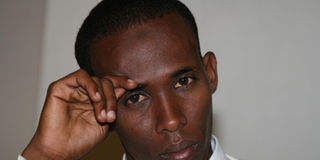Torture claims twist in KCSE leak probe

Mr Ahmednasir Ibrahim, who reported to police that he was abducted and tortured by people who accused him of being involved in leaking the ongoing Form Four examinations. Photo/WILLIAM OERI
A university student has accused officials of the Kenya National Examinations Council of torturing him in an exam leak investigation.
Mr Ahmednasir Ibrahim, a fourth year student of the University of Nairobi, reported to police that he was abducted from City Hall Way on his way to Jamia Mosque and tortured by people who accused him of being involved in leaking the ongoing Form Four examinations.
He told police that he was bundled into a car, blindfolded and taken to the basement of National Housing Corporation house off Harambee Avenue and thereafter to offices in the building where he was forced to undress before he was beaten and held against his will.
The incident took place four days before the start of Form Four exams which, on the second day, were marred by bizarre delays that saw candidates in some areas finish their papers at 2am the following morning.
Neither the ministry nor Knec has explained the delay, with the council insisting that there was no exam leak. CID officers from Nairobi’s Central Police Station are investigating the torture claims and have interviewed a senior Knec officer identified as Maundu Matenzawa.
Nairobi criminal investigations boss Peter Mabeya said Mr Matenzawa had admitted that officials from the council questioned the student. He also said Mr Matenzawa did not provide details of the exact leak claim or how the student was implicated.
Mr Mabeya said investigations into the matter were still ongoing so he could not give further details. The bizarre incident happened on the week when there were widespread delays in giving the maths paper in the ongoing Kenya Certificate of Secondary Education examinations.
Some schools used photocopied question papers. Knec denied that the mess had anything to do with a leak, but there have been claims that the delay was caused after Knec detected that unknown people may have had prior access to the math paper from its South C stores. The council cancelled the paper altogether.
Exam papers are usually printed outside the country. As a precaution, the council ordered the printing of an emergency paper, a logistical nightmare leading to the delays given the massive exercise of running 358,000 copies and marshalling transport and security teams.
Daily Nation sources said late printing of the emergency paper was the cause of the delay in the delivery of the exam to schools on October 23. Some schools received the scripts as late as 2pm on Friday, with others sitting the exams until 1am in Laikipia.
Education permanent secretary James ole Kiyiapi, who has been crisscrossing the country to ensure smooth running of the exams, said the council had not briefed him on the issue. He said it was the council that was charged with ensuring security of examinations. “Ours is only policy and administration,” he said.
Mr Wasanga declined to comment on the student’s arrest or to say if any papers had been stolen. Daily Nation sources said that after the maths paper debacle, the council shelved its plan of providing a daily update on the progress of the exam.
Mr Wasanga explained the maths paper delay by saying that it was the council’s strategy to send papers to schools close to the day of examinations. Questions were raised as to why the council decided to deliver the papers to far-flung areas on the day of exams, yet Mr Wasanga had promised that question papers would be delivered a week in advance.
Mr Wasanga has disputed claims that the papers had been leaked and his council was forced to print an emergency paper. Other than for October 23, the papers have proceeded smoothly and were delivered on time.
The Kenya National Association of Parents criticised the delays in the maths paper and called for a repeat. Candidates who sat the examinations late were at least in theory exposed to the possibility of leaks from those who sat theirs earlier in regions like Nairobi.
Reported by Dominic Wabala, Samuel Siringi and Benjamin Muindi




